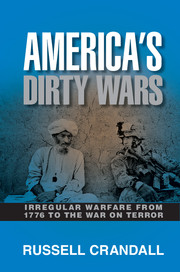Book contents
- Frontmatter
- Dedication
- Contents
- List of Figures
- Acknowledgments
- 1 Introduction
- 2 Irregular Warfare 101
- Part One The American Revolution to Chasing Sandino, 1776–1930s
- Part Two The Cold War, 1940s–1989
- Part Three Latin America and the Cold War, 1950s–1980s
- 20 From Guatemala, 1954, to Cuba and the Bayof Pigs, 1961
- 21 Guatemala, Post-1963
- 22 Cuba, Post-1963
- 23 Intermezzo
- 24 Carter, Reagan, and the Sandinista Revolution in Nicaragua, 1979–1990
- 25 El Salvador, 1979–1992
- Part Four Post–Cold War, 1990s–2000s
- Notes
- Bibliography
- Index
23 - Intermezzo
Che Guevara and Guerrilla Warfare
Published online by Cambridge University Press: 05 July 2014
- Frontmatter
- Dedication
- Contents
- List of Figures
- Acknowledgments
- 1 Introduction
- 2 Irregular Warfare 101
- Part One The American Revolution to Chasing Sandino, 1776–1930s
- Part Two The Cold War, 1940s–1989
- Part Three Latin America and the Cold War, 1950s–1980s
- 20 From Guatemala, 1954, to Cuba and the Bayof Pigs, 1961
- 21 Guatemala, Post-1963
- 22 Cuba, Post-1963
- 23 Intermezzo
- 24 Carter, Reagan, and the Sandinista Revolution in Nicaragua, 1979–1990
- 25 El Salvador, 1979–1992
- Part Four Post–Cold War, 1990s–2000s
- Notes
- Bibliography
- Index
Summary
The unexpected ease with which the Cuban revolutionaries overthrew Batista led them to conclude that the same thing should and could be done in other countries in Latin America. Castro told the crowds gathered at a rally in Havana in 1959 that the time had come to liberate the hemisphere:
How much America and the peoples of our hemisphere need a revolution like the one that has taken place in Cuba! How much America needs an example like this in all its nations. How much it needs for the millionaires who have become rich by stealing the people’s money to lose everything they have stolen. How much America needs for the war criminals in the countries of our hemisphere to be shot.
Che, in particular, became a strong proponent for exporting armed revolution to other parts of the hemisphere. Influenced by Mao’s writings from three decades earlier, he and fellow Cuban leaders believed that other revolutionaries could simply follow a straightforward yet crucial textbook that could teach them how to become successful revolutionaries. In fact, by 1960 Che had authored a tome entitled Guerrilla Warfare that became requisite reading for budding revolutionaries across the hemisphere.
Che believed that “a hard core of thirty to fifty men [was] enough to initiate armed revolution in any Latin American country.” Based on the experience in Cuba, he highlighted three strategies for a successful revolutionary war. First, Che contended that this small band of committed fighters could take revolution into their own hands, providing the spark for mass revolt rather than waiting for another precipitating event to occur. He also posited that popular forces could win against a regular army. Guerrilla warfare, waged with the support of civilians, could bring a conventional army to its knees by wearing down its ability and its resolve to fight. Third, he maintained that in the Latin American context, the best place to “center” subversive activity was in the countryside, where, due to often horrible working conditions and a skewed distribution of land, “class contradictions are at their most violent.” These three tenets constituted the heart of foco theory.
- Type
- Chapter
- Information
- America's Dirty WarsIrregular Warfare from 1776 to the War on Terror, pp. 277 - 279Publisher: Cambridge University PressPrint publication year: 2014



